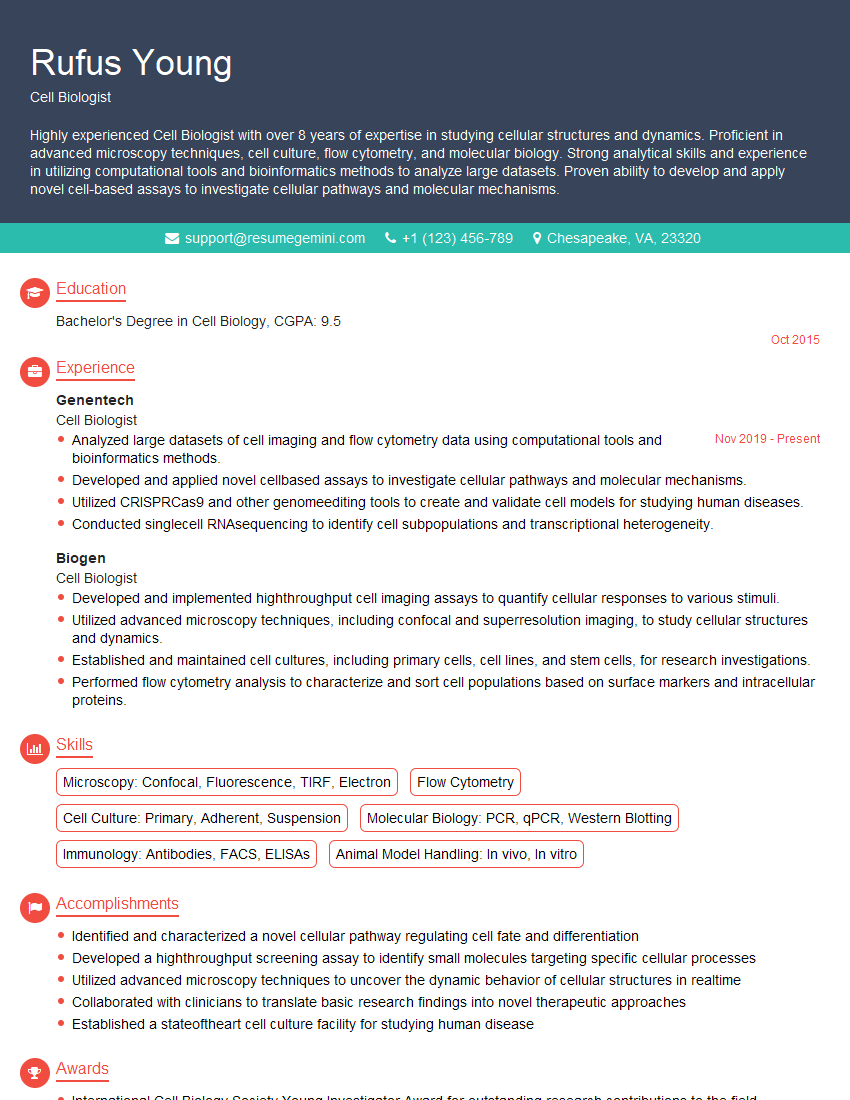Are you a seasoned Cell Biologist seeking a new career path? Discover our professionally built Cell Biologist Resume Template. This time-saving tool provides a solid foundation for your job search. Simply click “Edit Resume” to customize it with your unique experiences and achievements. Customize fonts and colors to match your personal style and increase your chances of landing your dream job. Explore more Resume Templates for additional options.

Rufus Young
Cell Biologist
Summary
Highly experienced Cell Biologist with over 8 years of expertise in studying cellular structures and dynamics. Proficient in advanced microscopy techniques, cell culture, flow cytometry, and molecular biology. Strong analytical skills and experience in utilizing computational tools and bioinformatics methods to analyze large datasets. Proven ability to develop and apply novel cell-based assays to investigate cellular pathways and molecular mechanisms.
Education
Bachelor’s Degree in Cell Biology
October 2015
Skills
- Microscopy: Confocal, Fluorescence, TIRF, Electron
- Flow Cytometry
- Cell Culture: Primary, Adherent, Suspension
- Molecular Biology: PCR, qPCR, Western Blotting
- Immunology: Antibodies, FACS, ELISAs
- Animal Model Handling: In vivo, In vitro
Work Experience
Cell Biologist
- Analyzed large datasets of cell imaging and flow cytometry data using computational tools and bioinformatics methods.
- Developed and applied novel cellbased assays to investigate cellular pathways and molecular mechanisms.
- Utilized CRISPRCas9 and other genomeediting tools to create and validate cell models for studying human diseases.
- Conducted singlecell RNAsequencing to identify cell subpopulations and transcriptional heterogeneity.
Cell Biologist
- Developed and implemented highthroughput cell imaging assays to quantify cellular responses to various stimuli.
- Utilized advanced microscopy techniques, including confocal and superresolution imaging, to study cellular structures and dynamics.
- Established and maintained cell cultures, including primary cells, cell lines, and stem cells, for research investigations.
- Performed flow cytometry analysis to characterize and sort cell populations based on surface markers and intracellular proteins.
Accomplishments
- Identified and characterized a novel cellular pathway regulating cell fate and differentiation
- Developed a highthroughput screening assay to identify small molecules targeting specific cellular processes
- Utilized advanced microscopy techniques to uncover the dynamic behavior of cellular structures in realtime
- Collaborated with clinicians to translate basic research findings into novel therapeutic approaches
- Established a stateoftheart cell culture facility for studying human disease
Awards
- International Cell Biology Society Young Investigator Award for outstanding research contributions to the field
- National Institutes of Health Directors New Innovator Award for groundbreaking research on cellular mechanisms of disease
- Howard Hughes Medical Institute Early Career Scientist Award for innovative research in cell biology
Certificates
- American Board of Medical Laboratory Immunology (ABMLI)
- Certified Histotechnician (CHT)
- International Society for Advancement of Cytometry (ISAC) Certified
- Laboratory Accreditation Bureau (LAB)
Career Expert Tips:
- Select the ideal resume template to showcase your professional experience effectively.
- Master the art of resume writing to highlight your unique qualifications and achievements.
- Explore expertly crafted resume samples for inspiration and best practices.
- Build your best resume for free this new year with ResumeGemini. Enjoy exclusive discounts on ATS optimized resume templates.
How To Write Resume For Cell Biologist
- Highlight your technical skills and experience in microscopy, cell culture, and flow cytometry.
- Quantify your accomplishments with specific metrics whenever possible.
- Showcase your research experience and publications in relevant scientific journals.
- Tailor your resume to the specific job description and company you are applying to.
- Proofread your resume carefully for any errors in grammar or spelling.
Essential Experience Highlights for a Strong Cell Biologist Resume
- Developed and implemented highthroughput cell imaging assays to quantify cellular responses to various stimuli.
- Utilized advanced microscopy techniques, including confocal and superresolution imaging, to study cellular structures and dynamics.
- Established and maintained cell cultures, including primary cells, cell lines, and stem cells, for research investigations.
- Performed flow cytometry analysis to characterize and sort cell populations based on surface markers and intracellular proteins.
- Analyzed large datasets of cell imaging and flow cytometry data using computational tools and bioinformatics methods.
- Developed and applied novel cellbased assays to investigate cellular pathways and molecular mechanisms.
- Utilized CRISPRCas9 and other genomeediting tools to create and validate cell models for studying human diseases.
Frequently Asked Questions (FAQ’s) For Cell Biologist
What is the role of a Cell Biologist?
Cell Biologists study the structure, function, and behavior of cells. They use a variety of techniques to investigate how cells grow, divide, and interact with each other.
What are the qualifications for a Cell Biologist?
Most Cell Biologists have a Bachelor’s degree in Cell Biology, Biology, or a related field. Some Cell Biologists also have a Master’s degree or PhD.
What are the career prospects for a Cell Biologist?
Cell Biologists can work in a variety of settings, including academia, industry, and government. They can pursue careers in research, teaching, or biotechnology.
What are the challenges of being a Cell Biologist?
Cell Biology is a complex and rapidly changing field. Cell Biologists must be able to keep up with the latest research and developments in order to be successful.
What are the rewards of being a Cell Biologist?
Cell Biology is a fascinating and rewarding field. Cell Biologists have the opportunity to make important discoveries that can lead to new treatments for diseases and improve our understanding of the human body.
What are some of the most important skills for a Cell Biologist?
Some of the most important skills for a Cell Biologist include microscopy, cell culture, flow cytometry, and molecular biology.